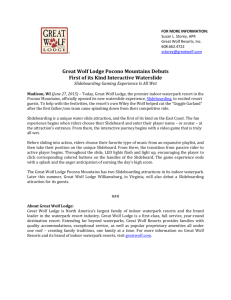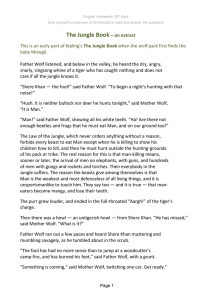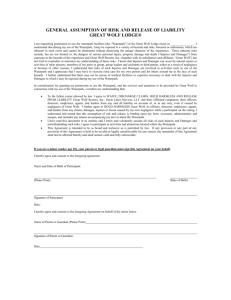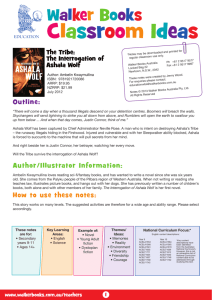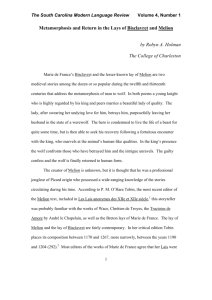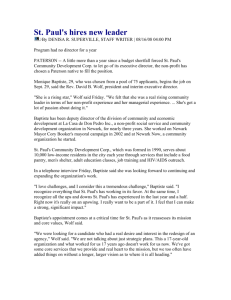English Literature - Wilmington Grammars` Sixth Form. WG6
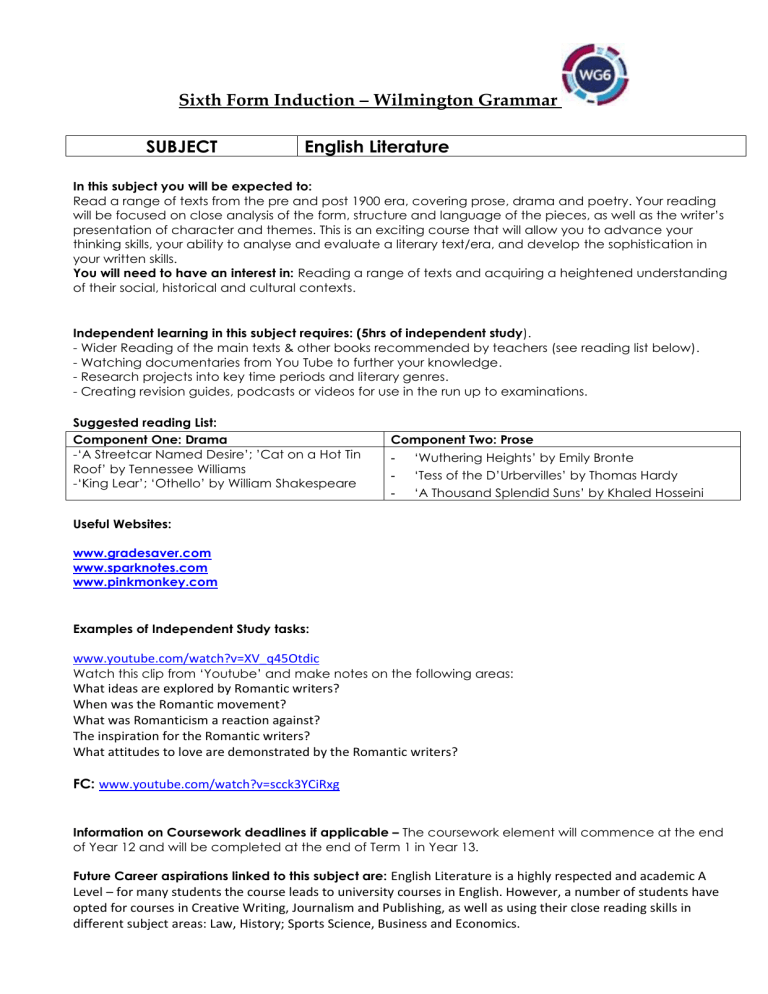
Sixth Form Induction – Wilmington Grammar
SUBJECT English Literature
In this subject you will be expected to:
Read a range of texts from the pre and post 1900 era, covering prose, drama and poetry. Your reading will be focused on close analysis of the form, structure and language of the pieces, as well as the writer’s presentation of character and themes. This is an exciting course that will allow you to advance your thinking skills, your ability to analyse and evaluate a literary text/era, and develop the sophistication in your written skills.
You will need to have an interest in: Reading a range of texts and acquiring a heightened understanding of their social, historical and cultural contexts.
Independent learning in this subject requires: (5hrs of independent study).
- Wider Reading of the main texts & other books recommended by teachers (see reading list below).
- Watching documentaries from You Tube to further your knowledge.
- Research projects into key time periods and literary genres.
- Creating revision guides, podcasts or videos for use in the run up to examinations.
Suggested reading List:
Component One: Drama
-‘A Streetcar Named Desire’; ’Cat on a Hot Tin
Roof’ by Tennessee Williams
-‘King Lear’; ‘Othello’ by William Shakespeare
-
-
-
Component Two: Prose
‘Wuthering Heights’ by Emily Bronte
‘Tess of the D’Urbervilles’ by Thomas Hardy
‘A Thousand Splendid Suns’ by Khaled Hosseini
Useful Websites: www.gradesaver.com
www.sparknotes.com
www.pinkmonkey.com
Examples of Independent Study tasks: www.youtube.com/watch?v=XV_q45Otdic
Watch this clip from ‘Youtube’ and make notes on the following areas:
What ideas are explored by Romantic writers?
When was the Romantic movement?
What was Romanticism a reaction against?
The inspiration for the Romantic writers?
What attitudes to love are demonstrated by the Romantic writers?
FC: www.youtube.com/watch?v=scck3YCiRxg
Information on Coursework deadlines if applicable – The coursework element will commence at the end of Year 12 and will be completed at the end of Term 1 in Year 13.
Future Career aspirations linked to this subject are: English Literature is a highly respected and academic A
Level – for many students the course leads to university courses in English. However, a number of students have opted for courses in Creative Writing, Journalism and Publishing, as well as using their close reading skills in different subject areas: Law, History; Sports Science, Business and Economics.
Induction
Task &
Success
Criteria
(Try to link to the first topic covered in
September so the students see the relevance of the task)
Deadline
1.
Write an analytical essay on the attached poem (‘Little Red Cap’ by Carol Ann
Duffy) based on the following task:
How does Duffy present the life journey of Little Red Cap? What life lessons does she learn?
2.
Read one of the texts from the suggested reading lists and write a one page review of it. You will need to include sections on: the main characters, the themes presented by the writer and important quotes.
If you are having problems with the task and need some advice please contact either sevans@wgsb.org.uk
.
First lesson in September
Little Red Cap – Carol Ann Duffy
At childhood's end, the houses petered out into playing fields, the factory allotments kept, like mistresses, by kneeling married men, the silent railway line, the hermit's caravan, till you came at last to the edge of the woods.
It was there that I first clapped eyes on the wolf.
He stood in a clearing, reading his verse out loud in his wolfy drawl, a paperback in his hairy paw, red wine staining his bearded jaw. What big ears he had! What big eyes he had! What teeth!
In the interval, I made quite sure he spotted me, sweet sixteen, never been, babe, waif, and bought me a drink, my first. You might ask why. Here's why. Poetry.
The wolf, I knew, would lead me deep into the woods, away from home, to a dark tangled thorny place lit by the eyes of owls. I crawled in his wake, my stockings ripped to shreds, scraps of red from my blazer snagged on twig and branch, murder clues. I lost both shoes but got there, wolf's lair, better beware. Lesson one that night, breath of the wolf in my ear, was the love poem.
I clung till dawn to his thrashing fur, for what little girl doesn't dearly love a wolf?
Then I slid from between his hairy matted paws and went in search of a living bird - white dove - which flew, straight, from my hands to his open mouth.
One bite, dead. How nice, breakfast in bed, he said, licking his chops. As soon as he slept, I crept to the back of the lair, where a whole wall was crimson, gold, aglow with books.
Words, words were truly alive on the tongue, in the head, warm, beating, frantic, winged; music and blood.
But then I was young - and it took ten years in the woods to tell that a mushroom stoppers the mouth of a buried corpse, that birds are the uttered thoughts of trees, that a greying wolf howls the same old song at the moon, year in, year out, season after season, same rhyme, same reason. I took an axe to a willow to see how it wept. I took an axe to a salmon to see how it leapt. I took an axe to the wolf as he slept, one chop, scrotum to throat, and saw the glistening, virgin white of my grandmother's bones.
I filled his cold belly with stones. I stitched him up.
Out of the forest I come, with my flowers, singing, all alone.
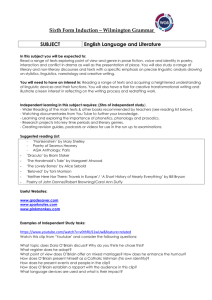
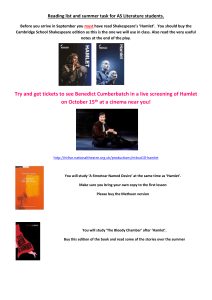
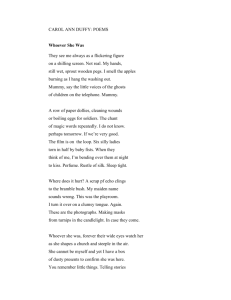
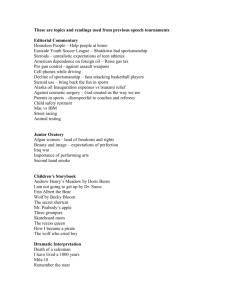
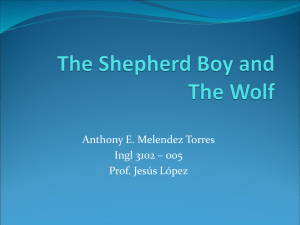
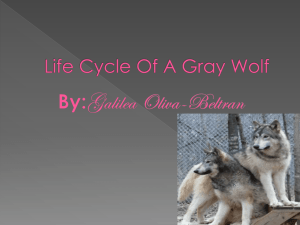
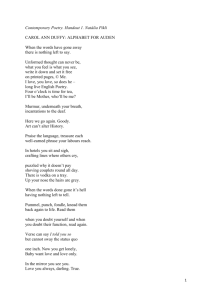
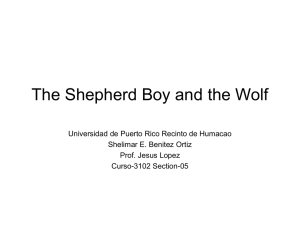
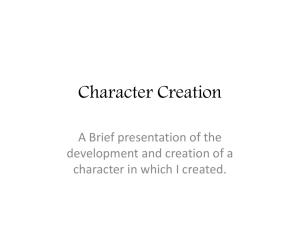
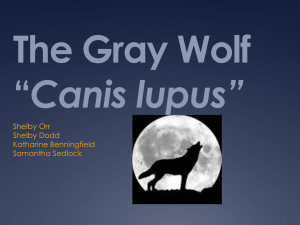
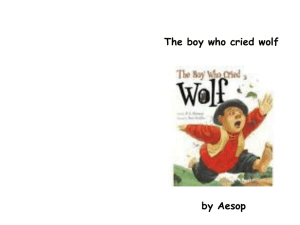
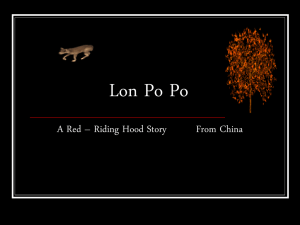
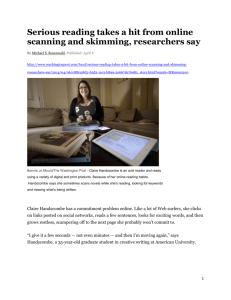
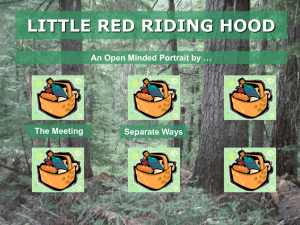
![Brandon Von Glahn Wolf v. Colorado [1949] 1. Case Fill out the](http://s3.studylib.net/store/data/008599852_1-6bf7dd84fe6745f2fd03e31039a2fa1b-300x300.png)
